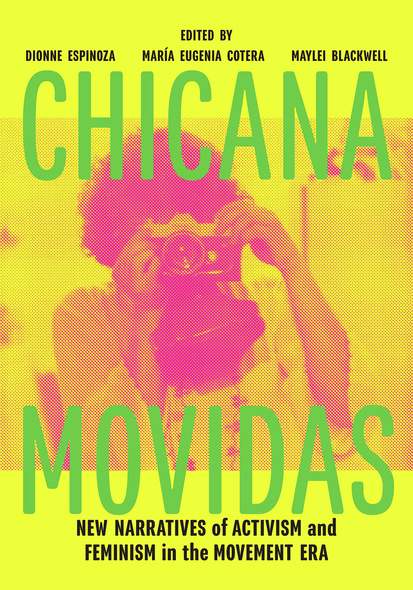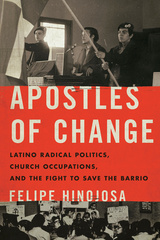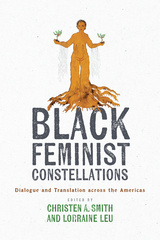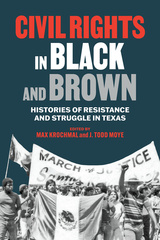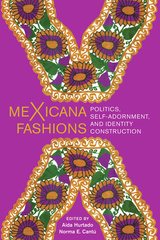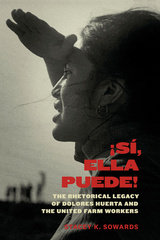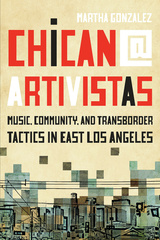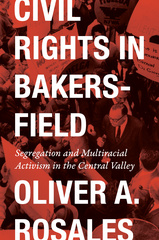Chicana Movidas
New Narratives of Activism and Feminism in the Movement Era
Winner, Best Multiauthor Nonfiction Book, International Latino Book Awards, 2019
With contributions from a wide array of scholars and activists, including leading Chicana feminists from the period, this groundbreaking anthology is the first collection of scholarly essays and testimonios that focuses on Chicana organizing, activism, and leadership in the movement years. The essays in Chicana Movidas: New Narratives of Activisim and Feminism in the Movement Era demonstrate how Chicanas enacted a new kind of politica at the intersection of race, class, gender, and sexuality, and developed innovative concepts, tactics, and methodologies that in turn generated new theories, art forms, organizational spaces, and strategies of alliance.
These are the technologies of resistance documented in Chicana Movidas, a volume that brings together critical biographies of Chicana activists and their bodies of work; essays that focus on understudied organizations, mobilizations, regions, and subjects; examinations of emergent Chicana archives and the politics of collection; and scholarly approaches that challenge the temporal, political, heteronormative, and spatial limits of established Chicano movement narratives. Charting the rise of a field of knowledge that crosses the boundaries of Chicano studies, feminist theory, and queer theory, Chicana Movidas: New Narratives of Activisim and Feminism in the Movement Era offers a transgenerational perspective on the intellectual and political legacies of early Chicana feminism.
Awards
-
, Winner - Best Multiauthor Nonfiction Book
This collection, like the Chicanas who challenged sexism during the Civil Rights Era, is anything but passive. There's nothing out there like it.
A riveting collection of essays and testimonios that set out to remember that which has been lost in the fire, the lineage of Chicana feminist visionary insurgencies...Chicana Movidas is vital reading to a vast array of academic disciplines and popular audiences interested in culture and history. It weaves a tapestry of recetas through which to recover and assert retrofitted Chicana memory praxis that tells the stories of Chicana feminisms in constant motion and imagination, provocation and movement.
Chicana Movidas makes a strong contribution to movement studies, as well as its feminist intentions…This collections marks how bearing witness to a movement and writing from the individual 'I' can be a key movida that inspires others to voice and incites other strategies for social change.
We are witnessing a new racial and social movement, and Chicana Movidas serves as the perfect companion to the new Chicana revolution...Focusing on multiple subjects, from race to gender and sexuality, this anthology serves as a refreshing contribution to social activism and identity equality.
A landmark anthology.
[A] timely and important book...The twenty-one scholarly essays, testimonies, and interviews included in this collection build on the work of pioneering Chicana feminist scholars, activists, and artists as they both trouble the construction of a homogeneous Chicana feminist subject by Chicano and feminist movement historiography and point to new and important lines of inquiry in Chicana feminist studies.
Chicana Movidas is the collection to advance the history of Chicanas and the historiography of the Chicano movement into the twenty-first century…masterful.
Chicana Movidas is a ceremonial discovery of powerful women who, through varied and diverse acts of mobilization, excavated spaces for Chicanas to thrive before, during, and after the Chicano movement era. This collection of first-person accounts, critical investigations, and interviews paints a vivid, detailed, and deeply personal picture of how these Chicana activists fostered spaces to express their complex identities, fight for their unique concerns, and make social change...all Chicanas deserve the ceremony of reading this book, not only to honor themselves and the women who grace the pages, but to heal, rejuvenate, and tap into a powerful collective consciencia.
Chicana Movidas challenges us to think more capaciously about the development of Chicana feminism and about movement history more generally. As this stunning collection offers us examples of the small acts that have helped to construct radical versions of feminism, it also provides considerable organizing insights for emerging activists who value anti-racist, anti-imperialist, and queer perspectives.
A revelatory, energetic mixtape of memory, theory, and movidas. Essential reading in Chicana/o studies.
Dionne Espinoza is a professor in the Department of Liberal Studies and the Program in Women’s, Gender, and Sexuality Studies at California State University, Los Angeles.
María Eugenia Cotera is an associate professor in the Departments of Women’s Studies and American Culture and the Program in Latina/o Studies at the University of Michigan.
Maylei Blackwell is an associate professor in the Departments of Chicana and Chicano Studies and Gender Studies at the University of California, Los Angeles.
- Acknowledgments
- Introduction: Movements, Movimientos, and Movidas (María Cotera, Maylei Blackwell, and Dionne Espinoza)
- Part I. Hallway Movidas
- Chapter 1. Francisca Flores, and the History of the League of Mexican American Women and Its Evolution into the Comisión Femenil Mexicana Nacional, 1958–1975 (Anna NietoGomez)
- Chapter 2. Mujeres Bravas: How Chicana Feminists Championed the Equal Rights Amendment and Feminist Agenda in 1977 at the Texas Women’s Meeting and the International Women’s Year National Conference (Martha P. Cotera)
- Chapter 3. “Women Need to Find Their Voice”: Latinas Speak Out in the Midwest, 1972 (Leticia Wiggins)
- Chapter 4. “It’s Not a Natural Order”: Religion and the Emergence of Chicana Feminism in the Cursillo Movement in San Jose (Susana L. Gallardo)
- Chapter 5. Many Roads, One Path: A Testimonio of Gloria E. Anzaldúa (Maylei Blackwell)
- Part II. Home-Making Movidas
- Chapter 6. La Causa de los Pobres: Alicia Escalante’s Lived Experiences of Poverty and the Struggle for Economic Justice (Rosie C. Bermudez)
- Chapter 7. Women Who Make Their Own Worlds: The Life and Work of Ester Hernández (Maylei Blackwell)
- Chapter 8. Feminista Frequencies: Chicana Radio Activism in the Pacific Northwest (Monica De La Torre)
- Chapter 9. Excavating the Chicano Movement: Chicana Feminism, Mobilization, and Leadership at El Centro de la Raza, 1972–1979 (Michael D. Aguirre)
- Chapter 10. The Space in Between: Exploring the Development of Chicana Feminist Thought in Central Texas (Brenda Sendejo)
- Chapter 11. Visions of Utopia while Living in Occupied Aztlán (Osa Hidalgo de la Riva and Maylei Blackwell )
- Part III. Movidas of Crossing
- Chapter 12. Forging a Black-Brown Movement: Chicana and African American Women Organizing for Welfare Rights in Los Angeles (Alejandra Marchevsky)
- Chapter 13. “Tu Riata Es Mi Espalda”: Elizabeth Sutherland’s Chicana Formation (Annemarie Perez)
- Chapter 14. “La Raza en Canada”: San Diego Chicana Activists, the Indochinese Women’s Conference of 1971, and Third World Womanism (Dionne Espinoza)
- Chapter 15. María Jiménez: Reflexiones on Traversing Multiple Fronteras in the South (Samantha Rodriguez and Stalina Emmanuelle Villarreal)
- Chapter 16. De Campesina a Internacionalista: A Journey of Encuentros y Desencuentros (Olga Talamante)
- Part IV. Memory Movidas
- Chapter 17. Unpacking Our Mothers’ Libraries: Practices of Chicana Memory before and after the Digital Turn (María Cotera)
- Chapter 18. Refocusing Chicana International Feminism: Photographs, Postmemory, and Political Trauma (Marisela R. Chávez)
- Chapter 19. La Mariposa de Oro: The Journey of an Advocate (Elena Gutiérrez and Virginia Martínez)
- Chapter 20. My Deliberate Pursuit of Freedom (Deanna Romero)
- Chapter 21. Manifesto de Memoria: (Re)Living the Movement without Blinking (Inés Hernández-Ávila)
- Notes
- Contributors
- Index

